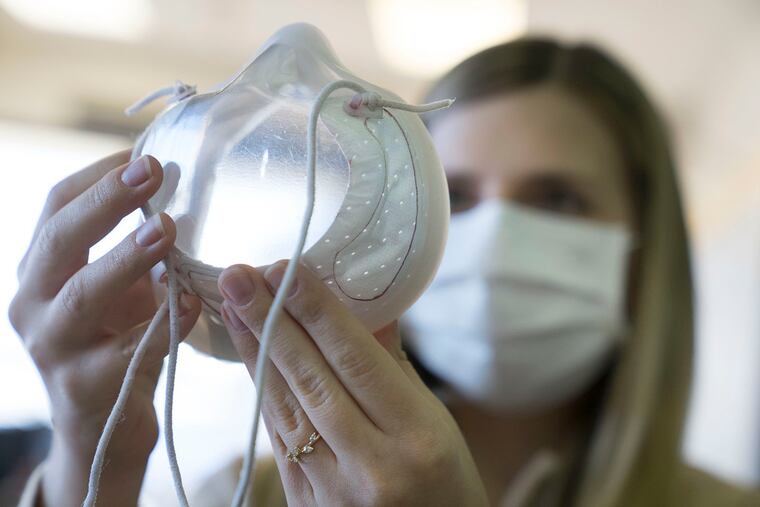Ford Motor Co.’s next pandemic mission: Clear N95 masks and low-cost air filters
Ford Motor Co. is rolling out clear face masks with N95-level filtration, in what could be the largest-scale effort to produce masks designed to improve communication.

Ford Motor Co. is rolling out clear face masks with N95-level filtration, in what could be the largest-scale effort to produce masks designed to improve communication while offering medical-grade protection against the coronavirus.
Masks make it more difficult to hear what the wearer is saying and impossible for those who rely on lip reading. The ability to read facial expressions also is crucial, as most communication is nonverbal, particularly for those in education, travel, sales, and other sectors.
“When you think about interactions in a work environment, and the people who might be … relying on lips to read expressions and understand day-to-day work, that becomes a challenge. It literally takes away another sense from somebody,” said Jim Baumbick, the Ford vice president overseeing its personal protective equipment manufacturing effort.
The auto giant has been producing face masks, ventilators, and face shields since March, through the launch of its Project Apollo, which organized Ford engineers to work with health officials and devise product solutions to deal with the coronavirus pandemic just days after the first wave of lockdowns. Since then, Ford has given away tens of millions of masks and is now turning proceeds from its health-care products toward manufacturing the clear respirators and air filtration kits, Baumbick said.
The new masks, which the company announced last week, will be washable and feature anti-fog technology, Baumbick said. They will be available this spring, pending N95 certification, but spokesman Mike Levine said pricing and distribution details were not yet available. Ford also unveiled a DIY air filtration kit for indoor spaces to reduce particle spread.
The Centers for Disease Control and Prevention has recommended that the public use cloth masks and reserve N95 masks — which offer a much higher level of protection against the coronavirus — for health-care and other frontline workers. But the United States has had a shortage of N95 masks for months, and now the spread of coronavirus variants has prompted some public health experts to recommend doubling up face coverings or donning medical-grade masks.
But for the millions of Americans with hearing loss, masks can make communication harder. Advocacy groups for the deaf or hard of hearing have encouraged the use of homemade face masks with clear windows over the mouth. Though they can be found online on Amazon and Etsy, Ford will be one of the first U.S. manufacturers producing them at scale.
Rebecca Hull recently launched a clear mask giveaway through the Independence Center, a nonprofit that advocates for people with disabilities in Colorado Springs. But Ford's rollout is the first clear mask she has heard of with N95-level filtration — and it's a technology she is hopeful will become the norm in the health-care field, even post-pandemic.
“The Independence Center’s clear mask giveaway project grew out of my frustration as a deaf individual and a lip-reader in a masked society,” Hull wrote in an email. “Real change occurs when we take the time to educate that disability is not the problem. Instead, it is the lack of accessible or alternative resources that creates a barrier. The example of masks during a pandemic illustrates this point.”
Bonnie Sachs, a neuropsychologist at the Wake Forest School of Medicine who works with older patients and research participants, said the clinic often scrounges around for clear masks to improve communication while taking exams that test memory.
"Many older adults have some form of hearing loss and may rely heavily on nonverbal cues like facial expression and lip-reading," Sachs said. "When they can't see your face as well or they can't read your lips as well, that may be a challenge because they can't hear you accurately to complete the cognitive testing."
Ford also released the open-source design for easy-to-assemble air filtration kits that can be used in high-concentrated indoor spaces, such as classrooms, to reduce virus particles. The company said it plans to donate as many as 20,000 kits, which include a cardboard base, a 20-inch box fan and a 20-by-20-by-4 air filter.
"Everyone's got Amazon boxes everywhere," Baumbick said. "We want to make sure it's available to everyone."
Ford also plans to continue its free medical-grade face mask distribution — 120 million in communities hard-hit by the coronavirus across the United States — at local dealerships and nonprofits through the middle of this year. The company has already donated 66 million masks to first responders, state and local officials, and schools since August.